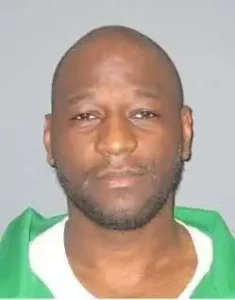Freddie Owens was sentenced to death by the State of South Carolina for the murder of Irene Graves
According to court documents Freddie Owens would rob a Speedway in which he would murder Irene Graves during the armed robbery
Freddie Owens would be arrested, convicted and sentenced to death
Update – Freddie Owens was executed on September 20 2024
Freddie Owens Photos

Freddie Owens Now
OWENS, FREDDIE EUGENE (00005065)
https://public.doc.state.sc.us/scdc-public/inmateDetails.do?id=%2000005065
Freddie Owens Case
The charges against appellant stem from the 4:00 a.m. November 1, 1997, armed robbery of a Speedway convenience store and fatal shooting of the store’s clerk, Irene Graves. Appellant was jointly tried with co-defendant Stephen Andra Golden. During jury qualification, Golden pled guilty.
During trial, the State introduced the Speedway security video which recorded the robbery and shooting. The video reveals two individuals entered the store. One individual shot Graves.
Golden admitted he was one of the Speedway robbers and claimed appellant was his accomplice. He testified appellant shot Graves in the head after she stated she could not open the safe. No forensic evidence connected appellant to the crime scene.
Nakeo Vance testified he, Golden, appellant, and Lester Young planned to rob the Speedway and, simultaneously, a nearby Waffle House. Golden and appellant robbed the Speedway. Vance and Young went to the Waffle House but did not carry out the robbery. After the Speedway shooting and robbery, Vance testified appellant admitted he shot the store clerk
Appellant’s girlfriend testified appellant told her he had robbed a store and shot the clerk
Detective Wood and Investigator Willis testified appellant initially gave a written statement denying involvement in the Speedway robbery and shooting. According to both witnesses, appellant later admitted he shot Graves
Appellant maintained he was at home in bed at the time of the Speedway robbery and shooting.1 He suggested the Sheriff’s Department’s investigation into the identity of Golden’s accomplice was inadequate. For instance, he asserted the Sheriff’s Department initially interviewed another individual who tested positive for gun powder residue, but failed to pursue this individual as a suspect. Alternatively, he suggested Vance was the accomplice. Appellant intimated witnesses who testified against him had various reasons to inculpate him in the crime. He also suggested witnesses falsely testified he made statements admitting he robbed the Speedway and shot the store clerk. Additionally, he claimed the Sheriff’s Department intimidated his mother into giving a written statement in which she asserted appellant admitted shooting the clerk. Appellant’s mother denied giving the statement
https://caselaw.findlaw.com/sc-supreme-court/1401150.html
Freddie Owens Execution
South Carolina has executed its first death row inmate in 13 years, administering a lethal injection to Freddie Owens.
Owens, 46, was found guilty by a jury of killing shop worker Irene Graves during an armed robbery in Greenville in 1997.
He was executed despite his co-defendant signing a sworn statement this week claiming Owens was not present at the time of the robbery and killing.
The South Carolina Supreme Court refused to halt Owens’ execution, saying the claims were inconsistent with testimony made at his trial.
Owens was executed at the Broad River Correctional Institute in Columbia, South Carolina, on Friday evening.
He was pronounced dead at 18:55 local time (22:55 GMT) after being injected with a drug called pentobarbital. He made no final statement.
His death followed a pause in executions in the state because prison officials were unable to procure the drug required for lethal injections.
Owens was sentenced to death in 1999, two years after killing Graves, after being convicted of murder, armed robbery and criminal conspiracy.
The day after he was found guilty, he killed his cellmate in jail, reports CNN affiliate WHNS.
According to reporting on his trial by South Carolina newspaper The State, Owens was 19 when he and Steve Golden, then 18, held Graves at gunpoint while attempting to rob the convenience store where she worked.
Owens shot and killed Graves after she failed to open a safe below the counter, according to testimony provided by Golden at Owens’s trial.
At the time of her death, Graves was a 41-year-old single mother of three.
Lawyers for Owens tried to halt his execution a few times, including twice in September. But the court denied each request.
In the latest attempt, lawyers pointed to an affidavit signed by Golden on Wednesday, which claimed Owens was innocent.
The court denied the request to halt the execution by saying that the new affidavit was “squarely inconsistent with Golden’s testimony at Owens’s 1999 trial” and the statement he gave to police right after their arrest.
Other witnesses testified that Owens had told them he shot Graves, prosecutors said.
Advocates against the death penalty and Owens’s mother also appealed to the state for clemency, which was denied by Governor Henry McMaster.
Hours before his execution, Owens’s mother said in a statement it was a “grave injustice that has been perpetrated against my son”.
“Freddie has maintained his innocence since day one,” his mother, Dora Mason, said, according to local news outlet the Greenville News.
Inmates in South Carolina are allowed to choose whether they want to die by lethal injection, electric chair or firing squad.
Owens deferred the decision to his lawyer, who chose the lethal injection option for him, according to the Greenville News.
Journalists who witnessed the execution said members of Graves’ family were also present.









